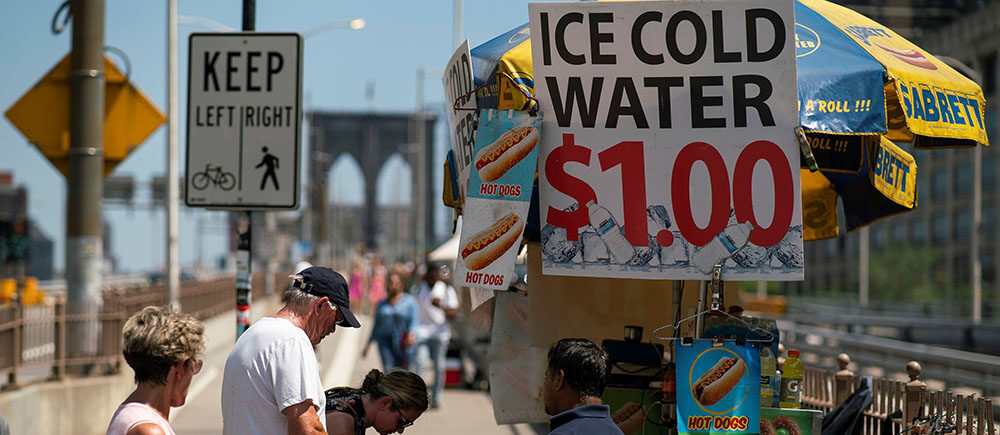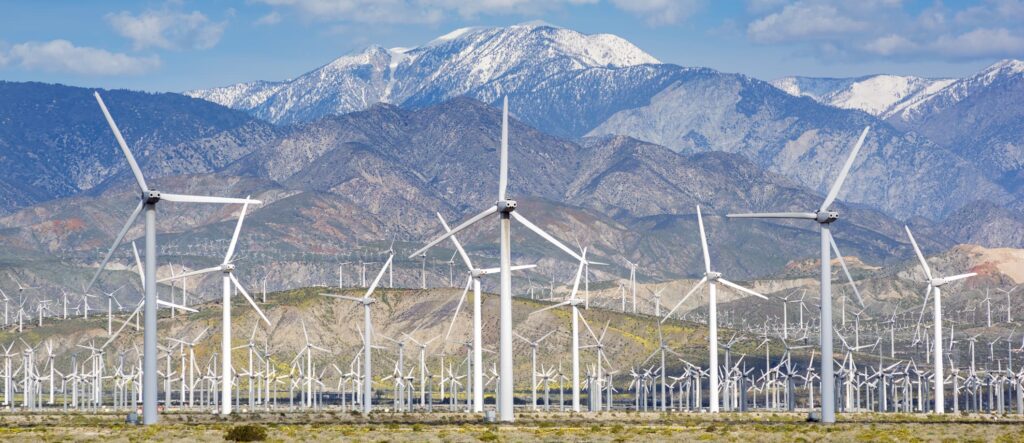CDN Backgrounder: The Case for Keeping Our Cool on Climate Change
TRANSCRIPT
You have stolen my dreams and my childhood with your empty words. And yet I’m one of the lucky ones. People are suffering. People are dying. Entire ecosystems are collapsing. We are in the beginning of a mass extinction, and all you can talk about is money and fairy tales of eternal economic growth. How dare you!
Greta Thunberg, speech to the UN, September 2019
John Robson
Climate emergency declarations, Extinction Rebellion, Fridays for Future.
These movements all share an outlook that’s beyond gloomy, it’s hysterical, and it’s damaging to society.
It’s especially damaging to children who are being recruited into a cause they can’t possibly have the knowledge base to critically assess, and which is filling them with terrifying visions of a hopeless and bleak future.
Narrator
Throughout history, times of mass hysteria have always led to terrible outcomes and widespread suffering. When we look at the bloody aftermath of the French Revolution, or the totalitarian nightmare of the Cultural Revolution in 1960s China, or the witch trials in Massachusetts in the 1690s, the common thread is panic.
But I don’t want your hope, I don’t want you to be hopeful. I want you to panic. I want you to feel the fear I feel every day. And then I want you to act. I want you to act as you would in a crisis. I want you to act as if the house was on fire, because it is.
Greta Thunberg, Davos World Economic Forum, January 2019
John Robson
And if you try to ask questions, or push back against this kind of rhetoric, you’ll be attacked as a “denier” or worse. Don’t you know we’re out of time to think?
But it’s at the moment when panic is at its worst that we are most in need of taking time for rational thought. So let’s risk being called names for a few minutes and try to think this one through.
I’m John Robson, and this is a Climate Discussion Nexus backgrounder on the Case for Keeping our Cool.
Suppose – it’s implausible, but – suppose you’re new to this topic of man-made global warming, or “anthropogenic climate change,” and perhaps you don’t have a lot of scientific training, so after looking at some of the issues, you figure you just want to go along with mainstream expert opinion. As you would if you wondered, say, how far the moon is from the Earth, or why the sky is blue, or whether the Earth is really round.
The trouble is that you’ll soon discover, if you don’t get shouted into a pigeonhole first, that the mainstream on climate change is actually a large and complex river with many currents and eddies. If you pick any specific topic, such as whether climate models are accurate, or how ocean currents affect climate, or whether global warming is good for plants, you’ll find there isn’t actually one orthodox view. There’s a broad range of opinion among scientists.
Narrator
If you just focus on reports of the UN Intergovernmental Panel on Climate Change, you will accept the view that the climate is warming, but that not all the warming is man-made.
This particular part of the mainstream view recognizes that at least some of the warming over the past hundred years is natural. It claims that at least half the warming since 1950 is probably man-made, but before 1950 it may have been mostly natural.
It says there’s no clear connection between greenhouse gases and most forms of extreme weather like hurricanes, floods, droughts and tornados. And that the frequency of such things has barely changed over the past century, though they may get worse in the future.
John Robson
It also says global warming over the next century could be very large, or very small, or somewhere in between. The IPCC’s experts are not unanimous that disastrous warming is coming. Not even close.
Narrator
The IPCC says that the economic impacts of warming over the next century will probably be small compared to most other changes in society, the economy and technology.
John Robson
It also says they might even be beneficial in some places, or very costly, or, again, somewhere in between. In short, the IPCC recognizes a great deal of uncertainty in the science and in the economics.
And I want to emphasize these are all mainstream views, taken from past IPCC reports. Yet if you say them out loud in many places today you stand a good chance of being attacked as a “denier”. And that’s because more and more of the public discussion of climate change has been hijacked by extremists.
Now hang on, you might say. The mainstream doesn’t run where you claim. It’s overwhelmingly convinced of the alarmist case.
I mean, surely you know that 97 percent of scientists agree that climate change is “real, man-made and dangerous?” Even Barack Obama tweeted it out, so it must be true, right? Well, no. That claim is untrue. If you want to see the numbers for yourself and the dubious statistical methodology behind those claims, watch our video on the 97% consensus.
Narrator
Here is some of the evidence that has led well-informed experts to the view that global warming is not a crisis or an emergency, and whatever problems it causes in the future will be manageable.
- While we’re living in an era of gradual warming, there’s lots of evidence that there have been past intervals in places around the world just as warm as today. Humans manage to thrive in all kinds of climates, and amidst all kinds of climate variability.
- Some computer models predict a strong future warming in response to greenhouse gases, but comparisons of model simulations to historical data also show they tend to warm the atmosphere too much compared to how much it warmed in the past.
- Countries with good-quality long-term climate records like Canada show very little change in temperature or other weather patterns in many locations despite the increase in greenhouse gases.
- As societies get wealthier, even if they experience warming, they also become less vulnerable to climate hazards. Climate-related deaths and weather damages as a fraction of the global economy have declined sharply over the past century.
- Use of fossil fuels in our cars and homes and factories generates far less air pollution now than in previous decades, because technology has improved so much.
- Even with the climate changes of the past 150 years, and even if they were all due to fossil fuel use, the availability of inexpensive and reliable energy has allowed living standards, life expectancy and health to get incomparably better than they were in the 1800s. No society has chosen to turn its back on the amazing benefits of fossil fuels.
- Economic estimates of the likely costs of future climate changes due to fossil fuel use are still so small that trying to phase them out would do far more harm than good to future generations.
John Robson
This isn’t “denialism” or Koch money talking, it’s sound, well-informed realism. It’s an optimistic view of our situation. But it’s based on solid, mainstream science, including, yes, IPCC reports.
Trying to speak reasonably in the midst of a public panic is difficult – it can even be dangerous, especially when all the so-called respectable people are competing with each other over who can become more shrill and extreme.
Because if the emissions have to stop, then we must stop the emissions. To me that is black or white. There are no gray areas when it comes to survival. Either we go on as a civilization or we don’t.
Greta Thunberg, TEDx Stockholm, January 2019
But the real threat to civilization is a loss of civility, which causes reasonable people to stay silent when panic starts to engulf society.
So my challenge to you, wherever you are, in whatever corner of the world, whether your voice is loud or quiet, push back against the panic, politely but firmly, and invite those around you to take a cool second look at things before we do things that could easily cause far more harm than good.
On top of that list is panicking.
For the Climate Discussion Nexus, I’m John Robson.



I fully support Greta because she has cute pigtails and makes me laugh a lot both of which make me smile and the scientific consensus is that smiling is good for you.
Excellent video, thank you for making the effort in a down to earth, succinct, and polished manner.
The Ontario Liberal government went into panic mode, skipped the cost/ benefit analysis and ushered in industrial wind turbines along our beautiful Great Lakes shorelines. The problems this has created are still not sorted out, even though that government was decimated and lost its party's status in the last election. To this day, the Conservative government has not fixed the problems that ensued because of the Green Energy Act, which was swiftly orchestrated to remove the democratic rights of rural residents in the communities where these turbines were sited.
Why were rural residents forced to be non- consenting subjects of a failed experiment?
They never thought about the birds killed. In 2012 the Spanish Ornithological Society reviewed actual carcass counts from 136 monitoring studies and concluded that Spain's 18000 wind turbines are killing more than 8 million birds and bats. Think of the killings being done by the 40000 plus U.S and Canadian wind turbines.
John,
I am so appreciative of you and the CDN's work. You along with Tony Heller (Real Climate Science) in the US seem to be the only voices of reason with a daily or weekly presence.
Anthropogenic climate change is not so much a scientific fact as a belief system, in much the same way that, for example, the practice of bloodletting was assumed to be of therapeutic value a couple of centuries and more ago. Anyone disputing the efficacy of bloodletting prior to Louis Pasteur's germ theory of disease in the 1860's would have been vilified as an ignoramus or a dangerous crank.
Unlike bloodletting, climate change is a deliberately developed belief system. Its development has depended on constant repetition and the suppression of all other points of view. But why? Who benefits? We can identify at least four separate strands.
1. Renewable energy. In this century about 4 trillion dollars (US) has been spent so far worldwide on wind and solar energy projects, and if we are to reach a zero-carbon state you can multiply this by at least a factor of 10. A lot of people are getting very rich as a result, not only on the wind and solar facilities themselves but also on the ongoing inflated price that we consumers have to pay for electricity generated from them. Now ask yourself how much of this tsunami of money would ever be spend if the concept of anthropogenic climate change had never entered our consciousness.
2. Political power. As H.L. Mencken said, “The whole aim of practical politics is to keep the populace alarmed (and hence clamorous to be led to safety) by menacing it with an endless series of hobgoblins, all of them imaginary”. Vote for us or the world is doomed makes a very effective election slogan.
3. Deep state power. Once you have a belief system going there will be large numbers of senior civil servants and academics who will build little empires around it, and who will therefore have a vested interest in keeping it going. Allowing the slightest hint of disbelief to creep into your official pronouncements will result in your being thrown out into the cold.
4. Environmental NGOs (ENGOs). Prior to the climate change belief system, ENGOs such as World Wildlife Fund were fairly small organizations typically focused on a single theme such as wildlife. However, by focusing on climate change they have tapped into a very rich vein of funding, and have become multi-billion dollar organizations with the ear of governments around the world. (Gerald Butts, Justin Trudeau's eminence gris, used to be the CEO of WWF Canada.)
There are probably other strands that I haven't mentioned here. However, one thing is certain: the anthropogenic climate change belief system is making a lot of people very rich and very powerful, at the expense, of course, of the rest of us peasants.